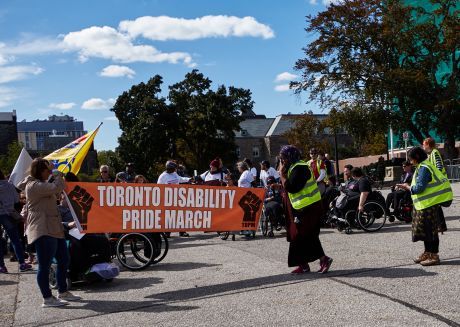Fight Ford!
You are here
Ford’s attack on Ontario’s poorest intensifies

January 1, 2019
Just a couple of months ago people in Ontario living on social assistance waited with bated breath while Ford’s Social Service Minister, Lisa McLeod, spoke the words that would lay out their fate during this administration.
After months of drumming up fears that the social assistance programs that more than 1 million Ontarians might be gutted, what came out was a carefully worded script of poverty shaming and workfare. As expected, they’re making Ontario Works (OW) and the Ontario Disability Support Program (ODSP) more restrictive and precarious.
The first line of attack will be to change the definition of disability, most likely to the definition used by CPP. Though the Ford government claims this will not affect current recipients, it still means that current applicants for ODSP with HIV, addictions, and mental health impairments may be forced to look for work when they are unable to do so, and try to survive on significantly less funds. For most, it’s the difference between being able to afford a tiny one-bedroom apartment, and trying to survive in the shelter system. McLeod would offer no comment on whether any increases in social assistance rates can be expected over the next three years.
The government also indicated that it will soon be harder to access supplementary benefits as well. Many people on social assistance rely on these supplementary benefits to be able to afford to eat.
McLeod tried to cushion the blow by announcing changes to the amounts of money that people on OW and ODSP can keep when they work. However, these changes benefit people who work less rather than more. No timeline was given for when these changes will start. Without any increase coming from the program itself, the announcement not only sets up a further divide between those who can work and those who can’t, but is essentially asking people living in poverty to cover the difference in the cost of living themselves.
Suspiciously, the Ford government is allowing people on ODSP to keep more of their own wages than people on OW. When you combine that with a proposed change in definition that suggests people with disabilities are disabled because they are unable to work, as the CPP definition does. This poses the question as to whether people with disabilities might find themselves off the program for trying to use this “benefit”.
All those who are deemed capable of working and on OW will be expected to comply with individual action plans using Ford’s “Open for Business” website. Local municipalities will be financially incentivized to create a revolving door of temporary employment, pressuring people into the worst jobs to keep their statistical success rates high. The door is certainly open to the privatization of delivery and services as well.
Social assistance has long been a vulnerable program in Ontario, having never fully recovered from the cuts under Mike Harris. ODSP and OW are the only benefit programs in the province not connected to a person’s employment, making social assistance an easy scapegoat for the declining state of capitalism. Forcing people off of social assistance and into precarious employment in the midst of a housing crisis won’t move people out of poverty.
As we ring in 2019, it’s important to remember to resist on behalf of those most vulnerable among us. Ford wants “the people” to see social assistance recipients as a collective burden. In reality, these cuts are part of an ongoing attack they have already carried on the minimum wage, workers’ rights, and job protections. In the coming months, we must continue this fight together.
Section:










